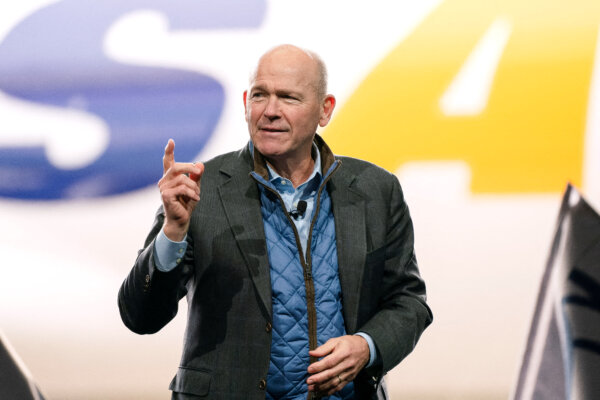
Mr. Calhoun’s Senate testimony comes after months of scrutiny from federal regulators after a midair blowout incident in January.
Boeing CEO Dave Calhoun, who plans to step down by the end of the year, will testify before the U.S. Senate on June 18 after regulators placed production caps on the 737 MAX airplane following multiple safety incidents, including a midair blowout of a door panel on an Alaskan Airlines flight.
The Federal Aviation Administration (FAA) in February blocked Boeing from increasing production on the 737 MAX following the blowout incident on Jan. 5. Sen. Richard Blumenthal (D-Conn.), chair of the Senate Permanent Subcommittee on Investigations, said Mr. Calhoun would testify about the company’s safety issues.
After two fatal 737 MAX 8 crashes in 2018 and 2019 that killed everyone on board, “Boeing made a promise to overhaul its safety practices and culture,” Mr. Blumenthal said.
“That promise proved empty, and the American people deserve an explanation,” he said.
Officials will say by July 7 what will happen regarding Boeing’s fate in the case that resulted from the fatal 737 MAX 8 crashes. The government also charged Boeing for allegedly hiding critical flight control software from regulators, which was likely the cause of the crashes, according to officials.
Boeing denies breaching the settlement and has said that it honored the Justice Department’s terms.
Mr. Calhoun, who previously worked at General Electric, became Boeing’s CEO in 2020 after the company fired former CEO Dennis Muilenburg for the fallout from the 737 MAX 8 crashes.
Industry sources say Boeing is considering Spirit AeroSystems CEO Pat Shanahan and Boeing Commercial Airplanes President Stephanie Pope. Mr. Calhoun indicated that he supports Ms. Pope as his successor, but investors, analysts, and others are looking for a candidate with both engineering and CEO experience.
Boeing indicated that it is eager for Mr. Calhoun to testify to the Senate regarding the company’s efforts to improve safety and quality in manufacturing.
An engineer from the aerospace manufacturer testified in April before Mr. Blumenthal’s committee that Boeing was dangerously cutting corners with the manufacturing of certain jets but that he was reassigned and scolded after informing his superiors. Boeing has rejected these allegations.
Mr. Blumenthal said he hopes that the CEO’s testimony will begin the process of confronting Boeing’s safety failures, restoring its public reputation, and renewing the company’s stronghold in the U.S. economy and national defense.
NASA announced two additional helium leaks in the craft’s propulsion system in the morning, but they did not prevent the crew from reaching the ISS.
Boeing’s chief engineer, Howard McKenzie, will join Mr. Calhoun on June 18 but will not testify, according to the committee.
The Senate Commerce Committee stated on June 5 that FAA Administrator Mike Whitaker will testify on June 13 about the agency’s oversight plans with Boeing and other aircraft builders.
In February, the administrator gave Boeing 90 days to create and implement a wider-reaching plan to confront “systemic quality-control issues” while capping production increases on the 737 MAX jet. These moves were a result of the Jan. 5 blowout incident.
Reuters contributed to this report.










